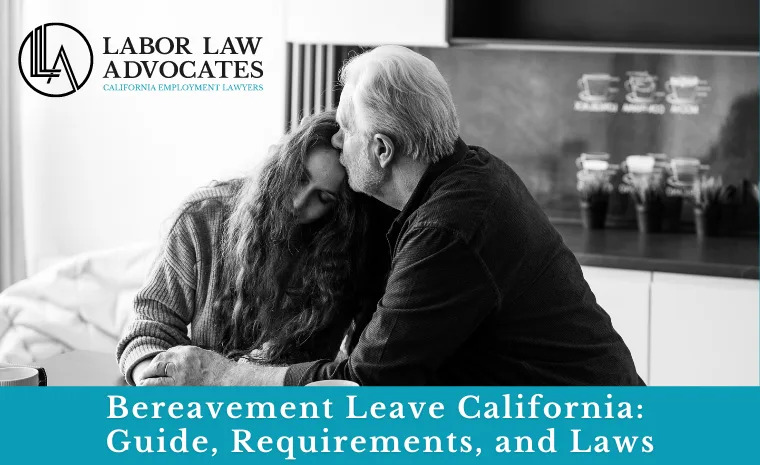In the ever-evolving landscape of labor law, understanding and adhering to regulations surrounding employee rights is paramount for both employers and employees alike. One critical aspect that often necessitates a delicate balance between work and personal life is bereavement leave. Recognizing the profound impact that the loss of a loved one can have on an individual, the state of California has implemented specific guidelines and laws to provide support during these challenging times.
California stands as the most populous state in the U.S., with over 39 million residents, and its workforce is a diverse group of professionals contributing to the state’s robust economy. With such a dynamic and expansive job market, it becomes imperative for employers and employees to be well-versed in the nuances of bereavement leave regulations.
After all, according to recent statistics, approximately 155,000 deaths occur in California annually, emphasizing the relevance and significance of comprehensive bereavement leave policies in the workplace.
Today’s blog, we will delve into the intricacies of the bereavement leave California, exploring the legal requirements, rights, and obligations associated with this critical aspect of employment law. As seasoned labor law attorneys, our aim is to provide clarity and insight into the regulatory framework governing bereavement leave, empowering both employers and employees to navigate this challenging terrain with confidence and compassion.
California Bereavement Leave: Scope & Purpose
Bereavement leave California is a crucial provision within the state’s employment laws that recognizes the profound impact of the loss of a loved one on an individual’s well-being. It is a specific type of leave granted to employees to allow them time off from work to cope with the emotional and practical aspects of dealing with a death in the family or among close relatives, providing employees with the necessary time and space to grieve, consult with a religious institution, attend funeral or memorial services, and manage the immediate aftermath of a loss without the stress of work responsibilities.
Bereavement leave is distinct from other types of leave, such as sick leave or vacation time, in that it is specifically designed to address the unique circumstances surrounding the death of a loved one. While sick leave is intended for personal illness, and vacation time for planned periods of rest and relaxation, bereavement leave acknowledges the unpredictable and emotionally challenging nature of losing a family member.
Unlike other forms of leave, bereavement leave is generally intended for a short duration, recognizing that the grieving process may vary among individuals. It is not intended as an extended period away from work but rather as a compassionate response to an immediate and impactful life event.
The distinct nature of bereavement leave reflects a recognition within employment laws that employees may require dedicated time and support to navigate the mourning process while maintaining a balance between their personal and professional lives. As such, it serves as a crucial component of a comprehensive and empathetic approach to workplace well-being in California.

Who is Eligible for California Bereavement Leave?
Eligibility for bereavement leave in California is generally determined by factors like the employer’s policies, employment contracts, premium wage rates, or collective bargaining agreements. While California state law does not mandate specific bereavement leave requirements, many employers offer such leave as part of their overall benefits package.
For that reason, employees should check their company’s policies to understand the eligibility criteria for bereavement leave. Some elements that might come into play when seeking a bereavement leave in California are:
- Exclusions and limitations: These can vary based on the company’s policies. Employers may specify certain conditions, such as a minimum length of service or full-time employment status, to qualify for bereavement leave. Employees should review their employment contracts or handbooks to identify specific exclusions or limitations that may apply.
- Qualifying family relationships: Bereavement leave typically includes immediate family members, such as parents, siblings, spouses, and children. However, some employers may extend the definition to encompass other family relationships, such as grandparents, in-laws, or domestic partners. The key is to consult the company’s bereavement leave policy to understand which relationships qualify.
- Timely and transparent communication: Open communication allows both parties to understand the situation and ensures that the employee receives the appropriate support during a challenging time. Employers may still require employees to provide documentation, such as a death certificate or obituary, to verify the need for bereavement leave.
In other words, eligibility for bereavement leave in California is contingent upon the employer’s policies, and employees should refer to their company’s guidelines to understand who qualifies for this type of leave.
Exclusions, limitations, and qualifying relationships may vary, which highlights the importance of reviewing your individual employment situation to understand the specific terms and conditions behind bereavement leave in your workplace.
Laws Surrounding California Bereavement Leave
As already discussed, the California state does not mandate specific bereavement laws. However, the state has governmental agencies, regulations and laws that may come into play, such as the California Family Rights Act (CFRA) and the federal Family and Medical Leave Act (FMLA). These laws provide eligible employees with the right to take unpaid leave for certain family and medical reasons, including the serious illness or death of a family member.
Here are some general considerations regarding bereavement leave California:
- Length of Bereavement Leave: The length of bereavement leave is typically determined by the employer’s policies. Some companies may provide a specified number of days for bereavement leave, while others may allow employees to take a reasonable amount of compensatory time to attend to matters related to the death of a family member. It is essential for employees to refer to their company’s policies to understand the duration of bereavement leave allowed.
- Paid vs. Unpaid Leave: In California, there is no state law requiring employers to provide paid bereavement leave. Paid or unpaid bereavement status is generally determined by the employer’s policies and any applicable employment contracts. Some employers may offer paid bereavement leave as part of their benefits package, while others may provide unpaid leave. Employees should review their employment agreements, hourly rate, and company policies to understand the compensation associated with bereavement leave.
- Use in Conjunction with Other Paid Time Off: Whether days of bereavement leave can be used in conjunction with other paid time off, such as sick leave or vacation, is typically outlined in the employer’s policies. In many cases, employees may be allowed to use accrued paid time off to cover some or all of their bereavement leave, depending on their company’s current policies.
Given the absence of specific state regulations on this leave, employees are encouraged to consult their company’s bereavement policies, employee handbooks and contracts, the applicable state and federal laws such as CFRA and FMLA, and specially an experienced labor law attorney to understand their rights and entitlements in the event of a bereavement.
Requirements for Bereavement Leave in California
Employee Obligations
Employees seeking days of bereavement leave are generally obligated to notify their employers as soon as possible about the need for leave. Clear and timely communication allows employers to make necessary arrangements and support grieving employees during their absence.
Employer Request for Documentation
Employers may request documentation to verify the need for bereavement leave. This documentation could include a death certificate, obituary, or other official records. While employers have the right to ask for such documentation, they should handle the request with sensitivity and respect for the grieving employee’s privacy
Notifying Employers in a Timely Manner
Timely notification is crucial when requesting bereavement leave. Employees are generally expected to inform their employers promptly and provide an estimate of the expected duration of their absence. This allows employers to plan for any necessary work adjustments or temporary replacements.
Employer Best Practices for Bereavement Leave
Bereavement Leave Policy
Employers are encouraged to have a clear and comprehensive bereavement leave policy in place. This policy should outline eligibility criteria, the duration of leave allowed, minimum wage requirements, any documentation requirements, and whether the leave is paid or unpaid. Clear communication of the policy ensures that employees understand their rights and helps employers manage bereavement situations with empathy and consistency.
Flexibility and Support
Bereavement is a deeply personal experience, and individuals may grieve in different ways and for varying durations. Employers can demonstrate empathy by being flexible with bereavement leave policies and offering additional support, such as flexible work schedules, remote work options, or access to employee assistance programs (EAPs).
Communication and Sensitivity
Employers should communicate their condolences and express sympathy when an employee experiences a loss. Sensitivity is crucial when discussing bereavement matters, and employers should avoid unnecessary probing into the details of the situation. Maintaining an open line of communication and offering support can contribute to a compassionate workplace culture.
Return-to-Work Support
Employers can support grieving employees upon their return to work by providing a supportive environment. This may include offering a gradual return to full workload, assigning a mentor or support person, or providing access to counseling services if available.
Training for Managers
Training managers on how to handle bereavement situations is essential. Managers should be equipped to offer support, recognize signs of distress, and handle any necessary workplace adjustments with compassion and professionalism.
By implementing these best practices, employers can create a workplace culture that acknowledges the human aspect of bereavement and provides the necessary support for employees during challenging times. This not only fosters employee well-being but also contributes to a more compassionate and understanding work environment.
The Importance of Empathy in the Workplace
Navigating the intricacies of bereavement leave law in California requires a thoughtful and empathetic approach from both employers and employees. As the most populous state in the nation, California’s diverse workforce faces the challenge of balancing professional responsibilities with the personal impact of losing a loved one. While state laws do not specifically mandate bereavement leave, employers are encouraged to establish clear and comprehensive policies, outlining eligibility criteria, duration, and any documentation requirements.
The absence of a specific legal framework underscores the importance of effective communication between employees and employers, as well as the need for legal counsel. Timely notification and transparent dialogue facilitate the necessary support and accommodations during a challenging time. It is crucial for employers to handle requests for bereavement leave with sensitivity, respecting the grieving employee’s privacy when seeking documentation.
In essence, as labor law attorneys, our commitment is to provide clarity and insight into the regulatory landscape, empowering employers and employees alike to navigate the complexities of bereavement leave with confidence and compassion in case of alleged violations.
By adhering to these principles, workplaces can not only meet legal requirements but also create a supportive environment that acknowledges the profound impact of loss on individuals and fosters a culture of empathy and understanding.




